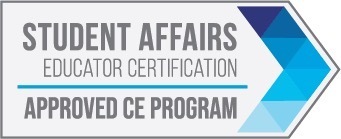
A Socio-ecological Approach to Student Affairs: Support Transfer Students
Recorded On: 06/13/2024
- Registration Closed
Joshua Braaten
Senior Success Coach
George Mason University
Joshua Braaten attended West Virginia University and earned a Bachelor of Science in Sports Management – envisioning a career in the business sector of scholastic or collegiate sport – and began pursuit toward a Master of Science over the spring/2024 semester. After graduating from WVU, Joshua began a profession in academia – but as an Academic Advisor at American Public University System where he developed a great passion for student services/coaching within higher education. He has now spent a decade+ working in a student services role at the
collegiate level. Joshua currently serves as a Senior Success Coach within the Success Coaching Unit at George Mason University.
Rebecca Mattern
Success Coach
George Mason University
Rebecca Mattern is a 2x Patriot, earning both her bachelor's and master's degrees from George Mason University. During her graduate program, she worked as an academic coach and a career counselor, which ultimately led her to pursue a career in higher education. Rebecca then continued her journey at George Mason University by joining the Student Success Coaching team. She continues to work as a Success Coach and as a University Studies instructor, where she teaches a course for students exploring majors and careers. Most recently, Rebecca was awarded Success Coach of the Year by NASPA’s Success Coaching Knowledge Community.
Sam Hediger
Success Coach
George Mason University
Sam Hediger is a PhD student at the George Mason Carter School for Peace and Conflict Resolution, working to better understand conflict systems and peacebuilding’s power to address them. While attaining his master’s degree in Conflict Resolution at Portland State University, he worked for three years as a Graduate Peer Mentor, supporting both students and faculty in their renowned University Studies undergraduate program. Sam is also a Success Coach at George Mason University and a co-chair for NASPA’s Men & Masculinities Knowledge Community.
Transfer students are an integral part of campus communities across a wide variety of institutions in the US. The number of degree-seeking undergraduate students who were enrolled in postsecondary institutions as transfer students in 2022 was 1,206,316. Despite these large numbers, research suggests that transfer students are an often overlooked population of students on our campuses. Utilizing Bronfenbrenner’s Socio-Ecological Model, this presentation seeks to provide student affairs professionals with a framework by which they can more holistically connect with transfer students within their context. By understanding each student’s micro-, meso-, and macrosystem outlined by Bronfenbrenner, we hope that student affairs professionals will be better able to provide inclusive and holistic support that can help transfer students not only remain in and graduate from college but leave school a more fully developed person than when they arrived.
Learning Outcomes:
1. Identify the unique needs of transfer students
2. Learn about the systems identified in Bronfenbrenner’s socio-ecological model
3. Use Bronfenbrenner’s model to better understand the systemic factors that affect transfer students
4. Reflect on one's role in the educational success of transfer students
5. Recognize the importance of collaboration among student affairs professionals
NASPA has been approved by the Higher Education Consortium for Student Affairs Certification to provide CE credit for Certified Student Affairs Educators (CSAEd). NASPA is solely responsible for all aspects of this program.
Guidelines for earning CE credit:
1 CE is awarded for attending this live session.
No partial credit will be rewarded.
Participants must also complete the feedback survey in the Online Learning Community.
Credit is available for attending the live session and viewing the on-demand recording.
To receive CSAEd credit, attendees must complete the Feedback Survey in the online event offering the certification. Once the survey is completed, your Certificate will be available in the event modules. The Certificate of Completion, which will show the event and credit earnings, is available for download and/or print from the event in your Online Learning Community.
